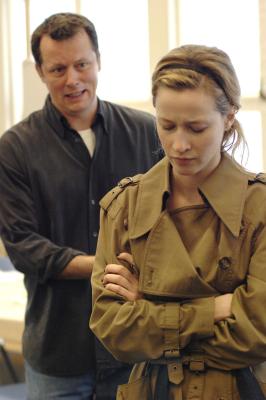Powerful Drama Blurs Lines Between Love and Abuse
(c) Mercury News
May 4, 2007
By Karen D'Souza
But their relationship is not an easy thing to put into words. The sexual history at the core of David Harrower's devastating new play "Blackbird" is as intense and elusive as it is disturbing. The more we know about these people's past, the less we want to know, but the playwright keeps us off balance with relentless reversals in emotion that careen us from the depths of despair to the soiled catharsis of uncomfortable laughter. We cannot find firm ground here. The foundation just keeps shifting. In its deeply compelling West Coast premiere at ACT in San Francisco, this is an epic story played out in the grubbiest of settings, a deeply disturbing romance that leaves the viewer shaken by its power. He is Peter, a handsome man in his mid-50s, his hair going a bit gray, his manner calm, his voice soothing. This is a man who puts great stock in appearing normal, average, harmless, just like everyone else. That's because he was not always Peter. Fifteen years ago, he was Ray, he lived in a different town and had a different job and had an affair with a 12-year-old girl named Una. She is 27 now (as played by the mesmerizing Jessi Campbell), and she has sought out the man (played by Steven Culp) who changed her life, the man she loved, the man who destroyed her sense of self. One moment her eyes are alight, shining bright with the pleasure of remembering. The next, her exuberance seems snuffed out entirely, stifled by so many years of loss and regret. Campbell enthralls. At the start, Una wraps her raincoat around herself like armor. As she slowly sheds that outer covering, she also undoes her defenses, until finally she seems a little girl, forever locked inside her self of 15 years ago, unable to let the past go. Campbell's central monologue comes in great harrowing heaves of memory and anger and pain. She is in a perpetual state of mourning for her lost innocence. Director Loretta Greco has trapped the characters effectively inside the meager confines of the space. They circle each other, then clash and flee to opposite ends of the room, but there's never any way out. They are bound together, desperate to believe that what they once shared was more than abuse, desperate to believe that they loved each other. The tragedy of their lives is cast into high relief by the playwright's spare use of language. Una is almost beyond words. Her most poignant communication comes in desperate clings, transfixed stares and plaintive wails. She cries out with her actions. She beseeches. But Harrower's genius is in his ability to see Ray/Peter through compassionate eyes. And Culp doesn't shrink from the character's nuance, the extent to which he is more than just a sexual predator. The actor taps into the man's vulnerability, his sad attempts to control his demons. He is a monster, but he is also a human being, and there is no way to shut out the knowledge that in his mind he was doing the right thing. That's a horrifying thing to realize, but the play comes at you with such force that it's impossible to avoid the impact. The text has such power because it is so sparse, so uncompromising. There is nothing to comfort us here. The palpable animal attraction between the characters repulses us even as it pulls them inexorably together. In the end, Una is left all alone, lost to grief, while we are left grappling with the ache of ambiguity. The upshot: A devastating, powerful new drama about two people held in thrall by a sexual obsession as intense and elusive as it is disturbing. Where: American Conservatory Theater, 415 Geary Blvd., San Francisco When: 8 p.m. Tuesdays through Saturdays, 2 p.m. Saturdays and Sundays Through: May 27 Running time: 90 minutes (no intermission) Tickets: $13.50-$81.50; (415) 749-2228, act-sf.org |
DISCLAIMER: This site is a Steven Culp fan site and is not affiliated with Steven Culp, his family or any of his representatives.
Unless otherwise noted, all captures were made by me from videos from various sources. All shows and photos belong to their respective owners.
NO COPYRIGHT INFRINGEMENT INTENDED!
© 2004-2022 SConTV.com and Steven-Culp.com
Unless otherwise noted, all captures were made by me from videos from various sources. All shows and photos belong to their respective owners.
NO COPYRIGHT INFRINGEMENT INTENDED!
© 2004-2022 SConTV.com and Steven-Culp.com
